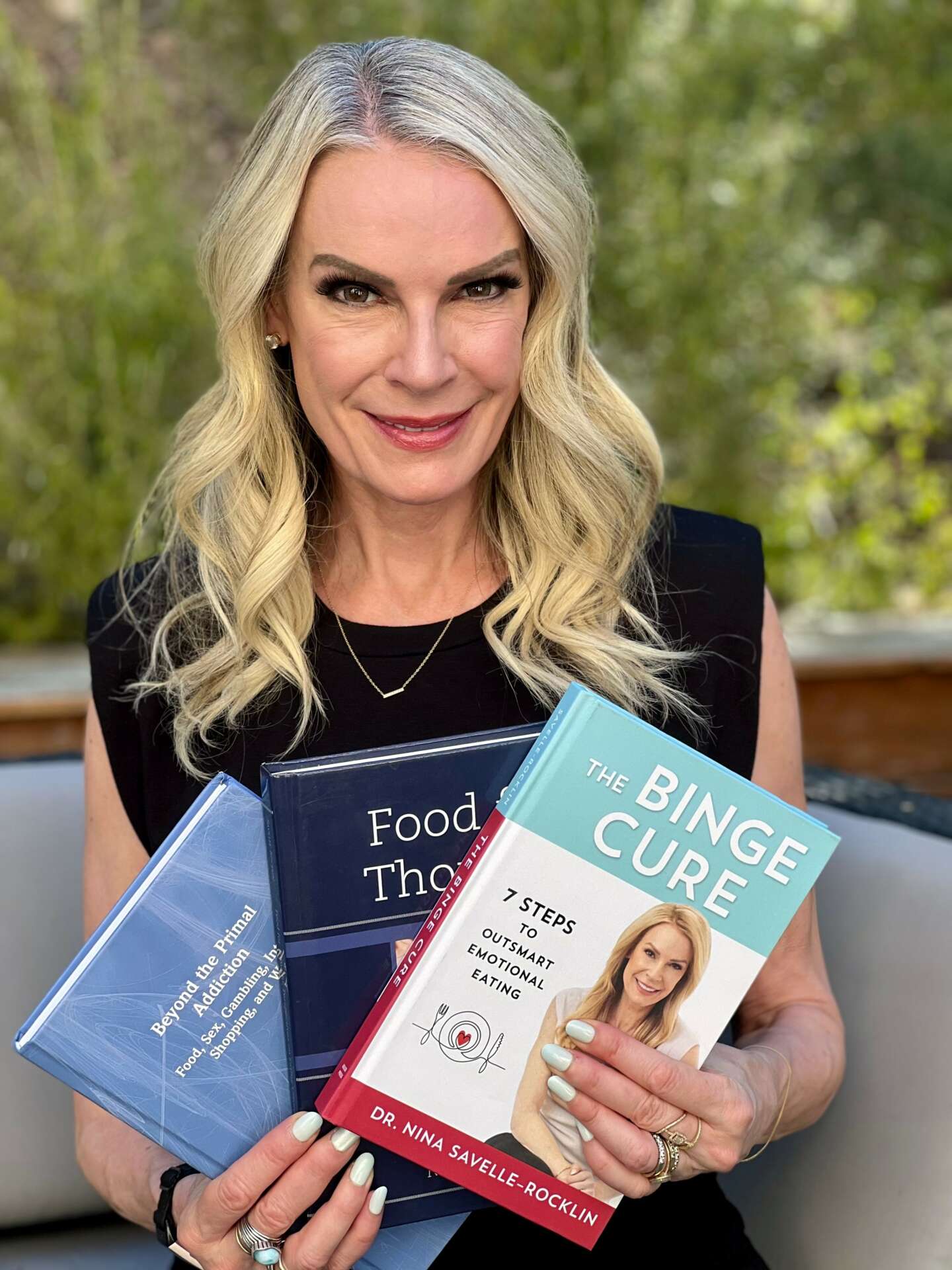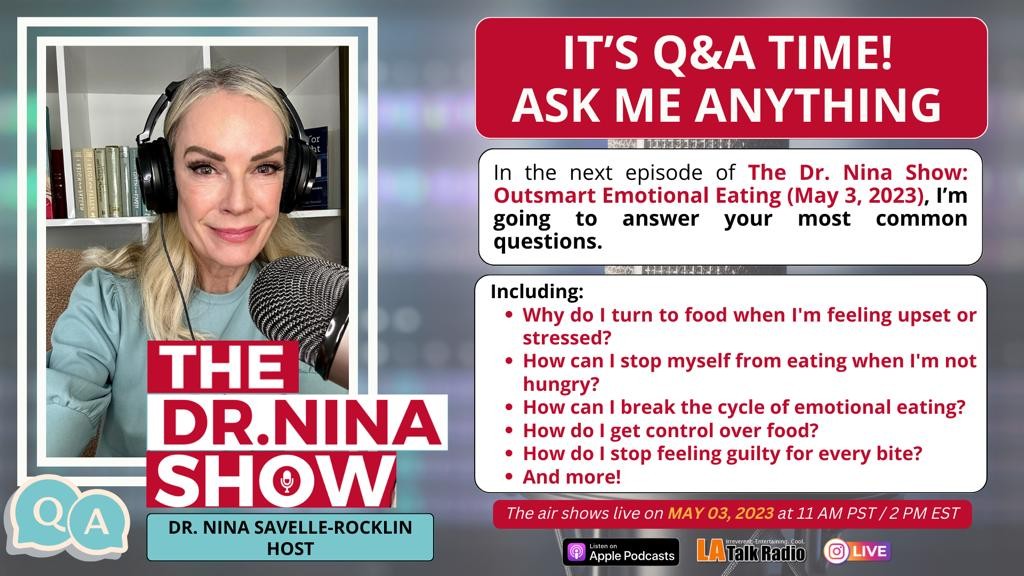We’re excited to introduce you to the always interesting and insightful Nina Savelle-Rocklin. We hope you’ll enjoy our conversation with Nina below.
Nina, looking forward to hearing all of your stories today. Was there a moment in your career that meaningfully altered your trajectory? If so, we’d love to hear the backstory.
I was a brand-new therapist and I was about to start my very first group for women with binge eating disorder.
I opened the door and one of the women–bright red hair, in her 50s, a little scary–she looked me up and down and says…
“You’re the therapist? Seriously?”
I tried to figure out the problem:
Was she expecting someone older, with more experience?
Was it totally obvious that this was my first group?
And then she said, “So, what does a skinny bitch like you know about bingeing?”
What she didn’t know was I once considered myself the poster child for eating disorders.
What I said was, “This skinny bitch once scarfed down an entire box of gingerbread cookies in about 15 minutes flat… And I hate gingerbread, but I couldn’t stop eating those cookies.”
I told the group that when I was 5 years old I came to believe that if I were thinner, I’d somehow be better.
That was the beginning of my obsession with my weight and with food.
When I look at my teenage journals, every page is filled with numbers:
Calories I ate.
Calories I burned…
The weight I was…
The weight I was going to be
I was always on some crazy, restrictive diet. Eventually, my willpower failed and I’d eat the kitchen… and sometimes I’d purge.
That’s why I was the poster child for eating disorders. I had all of them.
In college, I finally went to therapy…for anxiety.
I talked about guys, goals, dreams, fears. I was open with my therapist about every part of my life except one:
I never told her what was going on with food.
I was too ashamed of what I was doing. Too mortified. No one knew the truth.
But… by the time I left therapy, all my eating disorder behaviors were gone.
And not once—not a single time—had I told my therapist what was really going on with food.
That’s because food was never the problem, it was the solution to the true problem, my perfectionistic and judgmental attitude to myself.
And then I became a therapist because I wanted to help other people stop the obsession and the madness about food, weight, and body image.


As always, we appreciate you sharing your insights and we’ve got a few more questions for you, but before we get to all of that can you take a minute to introduce yourself and give our readers some of your back background and context?
A lot of people are struggling with food, weight, and body image issues.
The diet industry is a $60 billion per year industry. And business is booming.
According to the CDC, nearly half of all Americans are on a diet. That’s 162 million dieters. The UK has 13 million dieters. Australia has nearly 3 million dieters. And that’s just a few countries.
One study found that by the time an average woman is 45, she will have tried 61 diets.
People all over the world are losing weight… and gaining it back.
So, why is that?
For one thing, many of them have a diagnosable and treatable condition, binge eating disorder, and they don’t even know it.
As a psychoanalyst specializing in eating disorders, I know…
There is a reason our eating is out of control.
And that reason isn’t about control…
And it isn’t about willpower…
And it isn’t even about food.
As a psychoanalyst, I help people identify the hidden WHY they’re eating, and that’s a crucial first step to change.
Many people wonder what a psychoanalyst actually does. One of my patients said it perfectly. He’d previously had regular psychotherapy before being in analysis, and he said therapy is like snorkeling🏊♂️. For him, snorkeling was like dipping just below the surface, going only deep enough to see interesting things and make good observations🔍.
In contrast, he described analysis as like deep sea diving. “Analysis takes you to the bottom of the ocean where it’s pitch black and you can’t see anything, so you have to shine a light to see what’s going on down there.”
I find this a poetic and resonant description of psychoanalysis. Analysts and analytic therapists shine a light in the dark recesses of the mind, slowly bringing thoughts, wishes, ideas, and other hidden material up from the depths and allowing them to surface into conscious awareness.
The analogy illustrates the importance of going far beyond insight in order to make a change. Our goal is not only to illuminate what lurks in the dark, but also to bring those hidden parts into the light, so they can be processed and forever changed.
That’s why the relationship between therapist and patient is one of the most powerful keys to change.
After all, we don’t go deep sea diving alone.


Other than training/knowledge, what do you think is most helpful for succeeding in your field?
Training and knowledge are essential in this field, but I believe that the most crucial ingredient for success is relating to people from a place of genuine curiosity and interest.
Many who struggle think they’re broken and need to be “fixed” through therapy. I see it in a completely different way. My perspective is that we’re detectives of the mind looking for clues as to why someone is doing something they don’t want to do or not doing something they want to do.
I bring curiosity, kindness, and genuine interest, as well as training as a psychoanalyst, to my clinical private practice, books, and radio show. I believe this heartfelt passion for improving the human experience is what makes a difference.
Can you tell us about what’s worked well for you in terms of growing your clientele?
I give a lot of inspiration and information away for free or at a low cost because I’m passionate about spreading the word of hope. My radio show is available on Apple Podcasts and most podcast platforms. I write a weekly blog and have contributed over 50 articles on eating disorders and food, weight, and body image issues. I’ve appeared on many other podcasts, summits, and radio shows as a way of sharing information and inspiration. I do this because people need to know that their food issues are not about willpower, control, or addiction. I have also written three books (with two more in the pipeline). By putting so much content out there, it actually bring in more clients and patients. They learn about my signature Binge Cure Method and want to work with me directly. So giving away my knowledge has helped me reach more people and also grow my practice to a point where I help people who are located all over the world.
Contact Info:
- Website: https://drninainc.com/
- Instagram: https://www.instagram.com/dr.nina.psychoanalyst/
- Facebook: https://www.facebook.com/DrNina4help/
- Linkedin: https://www.linkedin.com/in/drnina4help/
- Youtube: https://www.youtube.com/c/Winthedietwar


